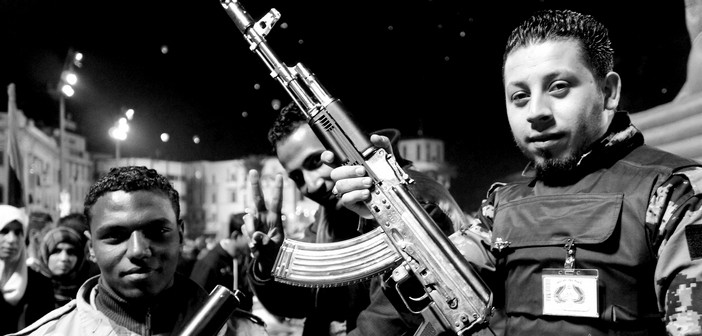In Libya’s remote southwest Saharan desert, the brutal proxy conflict in the oasis town of Ubari between the indigenous Tuareg and Tebu tribes, which has destroyed much of the town and displaced its residents, is illustrative of fights across Libya.
Variously supported or aligned with one of Libya’s two duelling governments and their international backers, here the prize is the area’s sprawling oil fields, airport and lucrative border trade.
Since Libya’s revolution that overthrew strongman Moammer Gaddafi after 42 years of rule in 2011, the fighting over Libya’s assets and power has plunged the country into turmoil.
Last summer’s raging battle over Tripoli’s international airport split the country’s government into two. The ‘Operation Dignity’ military alliance under General Khalifa Heftar, affiliated with the internationally recognized House of Representatives, was pitted against the more Islamist leaning forces of the ‘Libya Dawn’ campaign, of which Misratan brigades comprised a major part.
The victor, Libya Dawn, backed by Turkey and Qatar, installed members of the old General National Congress (GNC) and a cabinet to the ministries in Tripoli. In November, a Supreme Court declared the House of Representatives, now exiled in Tobruk and Beida in the east, illegitimate. The UAE, Egypt and France, among other EU countries, support the HOR.
The violent split has dealt a deadly blow to Libya’s economy. Reliant on an oil economy, the largest oil fields have stopped producing, and output is under 400,000 barrels per day, down from a peak 1.6 billion bpd from before the revolution.
The seizure of the lucrative central oil fields in 2014 by Ibrahim Jadran – the commander of the Petroleum Defense Guards tasked to secure national oil facilities – and the sabotage of the oil pipeline from the Sharara field by the Zintan tribe have been leading contributors to plummeting production.
Libya’s central bank and National Oil Corporation, who dole out the salaries of government employees – including the burgeoning militias – on both sides of the current conflict are in danger of running out of funds, and their neutrality is under attack with the confusing establishment of a dual CBL and NOC by the government in the east.
Meanwhile millions are being made by criminal networks off the lucrative business of smuggling of migrants through Libya and across the sea to Italy, as well as oil, drugs and weapons.
The revolutionary National Transitional Council (NTC), which governed Libya until an elected government from the opaque elections in 2012 was put in place, committed a series of irreversible missteps that set the Libyan state on the path for unravelling.
The NTC paid off revolutionary fighters for their role in overthrowing the dictator, ensuring that far more men turned up to collect generous financial rewards and medical treatment abroad than who actually fought.
Militias with weapons plundered from stockpiles proliferated. Instead of inducting fighters into a national army and police force, the expanding revolutionary brigades, determined by geography, resisted assimilation and the fight over assets commenced instead.
The grinding conflict has forced luxury hotels in downtown Tripoli, once bustling with foreign businesses, embassy officials, international NGOs and Libyan civil society, to largely shut down and the international community is exiled to neighbouring Tunisia.
Deep electricity cuts, unpaid salaries and a serious cash flow problem has had a dire effect on the economy. Kidnappings for ransom are rife. Many Libyan youths, giddy with their immediate post-revolutionary freedom, with hopes for a future in a Libyan state, have grown bitterly disillusioned and look to emigrate.
Activists have been largely silenced, forced underground or abroad. War-torn Benghazi, where the months-long fight between Heftar’s forces, who vowed to wipe out ‘terrorism’ is battling a coalition of fighters under Libya Dawn, including Ansar Al Sharia, who the US hold responsible for the killing of their ambassador to Libya, Chris Stevens. But residents are paying the steepest price.
In this chaotic security vacuum, the deadly extremist franchise, Islamic State, has taken root. First appearing in Derna last fall and pledging allegiance to IS Caliph Abu Bakr al-Baghdadi, they have since launched a spectacular attack on the luxury Corinthian hotel in downtown Tripoli in January.
Soon after, the gruesome beheadings of Egyptian workers along a Libyan beach announced the arrival of IS to Gaddafi’s hometown of Sirte – taking advantage of a weakened Ansar Al Sharia presence and marginalized population once favoured by Gaddafi – dangerously near Libya’s lucrative central oil crescent.
Since the deadly fight between IS and Misratan forces sent to confront them in March, the IS threat has only grown. Misratan brigades – stretched thin on many fronts battling Heftar’s coalition and now IS –have been pushed far back along the coastal road linking the two cities. The IS has now seized control of Sirte’s infrastructure and its surrounding areas, including direct routes leading to the central oil fields.
In the final stages of a UN-brokered dialogue by Bernadino Leon to forge a unity government in Libya, both Dawn and Dignity coalitions are fracturing further.
The GNC and its Dawn allies regard Khalifa Heftar, in his position as the HOR-appointed army chief, as a chief spoiler. The HOR, who are more accepting of the document which favours their place in power, complain about Islamist hardliners in Libya Dawn, like Abdelhakim Belhaj, formerly of the Libyan Islamic Fighting Group which was outlawed under Gaddafi.
Meanwhile, more grassroots peace talks are being quietly brokered, like that between tribal rivals Zintan and Zawiyah, with the Zintan agreeing to allow oil to flow from Sharara oil fields through their territory to the coast again.
However, battles still rage throughout Libya, including in Ubari, shattering the fragile peace deals put in place, that lack state infrastructure to back them up.
The question now is, despite these challenges, will Libya find a lasting peace soon?



